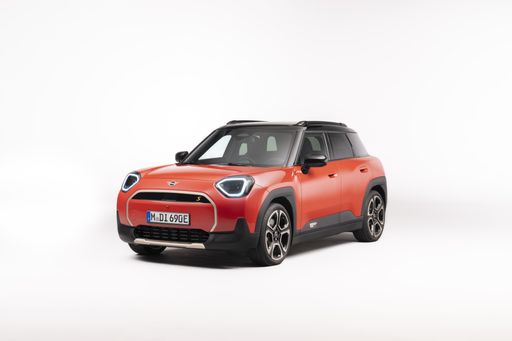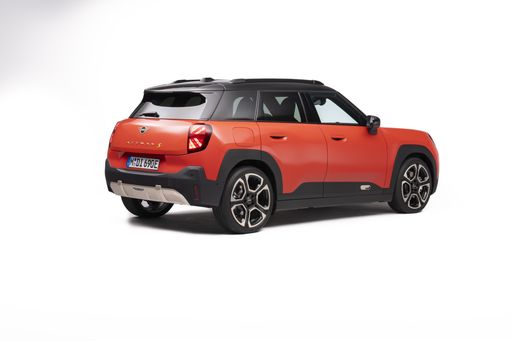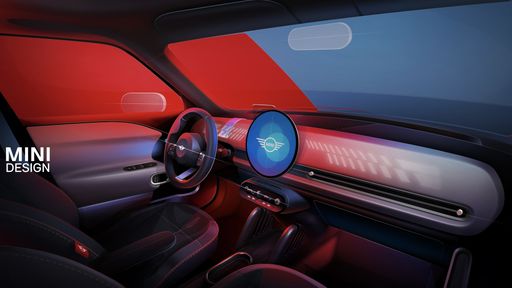Hyundai Kona vs MINI Aceman – Differences & prices compared
Compare performance, boot space, consumption and price in one view.
Find out now: which car is the better choice for you – Hyundai Kona or MINI Aceman?
The Hyundai Kona (SUV) comes with a Electric, Petrol or Full Hybrid engine and Automatic or Manuel transmission. In comparison, the MINI Aceman (SUV) features a Electric engine with Automatic transmission.
When it comes to boot capacity, the Hyundai Kona offers 466 L, while the MINI Aceman provides 300 L – depending on how much space you need. If you’re looking for more power, decide whether the 218 HP of the Hyundai Kona or the 258 HP of the MINI Aceman suits your needs better.
In terms of consumption, the values are 14.60 kWh4.60 L per 100 km for the Hyundai Kona, and 14 kWh for the MINI Aceman.
Price-wise, the Hyundai Kona starts at 23100 £, while the MINI Aceman is available from 25500 £. Compare all the details and find out which model fits your lifestyle best!
Hyundai Kona
The Hyundai Kona blends a bold design with a versatile interior, making it a standout choice in the compact SUV market. Its crisp handling and responsive steering provide an engaging driving experience, whether in the city or on the open road. The vehicle also offers a range of features designed to enhance comfort and connectivity, ensuring a pleasurable journey for both driver and passengers.
details @ hyundai.news
@ hyundai.news
 @ hyundai.news
@ hyundai.news
 @ hyundai.news
@ hyundai.news
 @ hyundai.news
@ hyundai.news
MINI Aceman
The MINI Aceman offers a fresh take on urban mobility, blending iconic design elements with modern technology. Its compact form is paired with an interior that exudes both comfort and style, making it a popular choice for city drivers. With an emphasis on sustainability, the Aceman features eco-friendly materials and innovative features that enhance the driving experience.
details @ press.bmwgroup.com
@ press.bmwgroup.com
 @ press.bmwgroup.com
@ press.bmwgroup.com
 @ press.bmwgroup.com
@ press.bmwgroup.com

|

|
|
|
|
Costs and Consumption |
|
|---|---|
|
Price
23100 - 41600 £
|
Price
25500 - 36200 £
|
|
Consumption L/100km
4.6 - 7 L
|
Consumption L/100km
-
|
|
Consumption kWh/100km
14.6 - 16.8 kWh
|
Consumption kWh/100km
14 - 16 kWh
|
|
Electric Range
377 - 514 km
|
Electric Range
303 - 405 km
|
|
Battery Capacity
1.3 - 65.4 kWh
|
Battery Capacity
38.5 - 49.2 kWh
|
|
co2
0 - 163 g/km
|
co2
0 g/km
|
|
Fuel tank capacity
38 - 47 L
|
Fuel tank capacity
-
|
Dimensions and Body |
|
|---|---|
|
Body Type
SUV
|
Body Type
SUV
|
|
Seats
5
|
Seats
5
|
|
Doors
5
|
Doors
5
|
|
Curb weight
1370 - 1773 kg
|
Curb weight
1720 - 1825 kg
|
|
Trunk capacity
466 L
|
Trunk capacity
300 L
|
|
Length
4350 - 4385 mm
|
Length
4079 mm
|
|
Width
1825 mm
|
Width
1754 mm
|
|
Height
1580 - 1585 mm
|
Height
1514 mm
|
|
Payload
420 - 490 kg
|
Payload
450 - 530 kg
|
Engine and Performance |
|
|---|---|
|
Engine Type
Electric, Petrol, Full Hybrid
|
Engine Type
Electric
|
|
Transmission
Automatic, Manuel
|
Transmission
Automatic
|
|
Transmission Detail
Manual Gearbox, Dual-Clutch Automatic
|
Transmission Detail
-
|
|
Drive Type
Front-Wheel Drive, All-Wheel Drive
|
Drive Type
Front-Wheel Drive
|
|
Power HP
115 - 218 HP
|
Power HP
184 - 258 HP
|
|
Acceleration 0-100km/h
7.8 - 11.9 s
|
Acceleration 0-100km/h
6.4 - 7.9 s
|
|
Max Speed
162 - 210 km/h
|
Max Speed
160 - 200 km/h
|
|
Torque
200 - 265 Nm
|
Torque
290 - 350 Nm
|
|
Number of Cylinders
3 - 4
|
Number of Cylinders
-
|
|
Power kW
85 - 160 kW
|
Power kW
135 - 190 kW
|
|
Engine capacity
998 - 1598 cm3
|
Engine capacity
-
|
General |
|
|---|---|
|
Model Year
2024 - 2025
|
Model Year
2024 - 2025
|
|
CO2 Efficiency Class
A, D, C, E, F
|
CO2 Efficiency Class
A
|
|
Brand
Hyundai
|
Brand
MINI
|
Hyundai Kona
The Hyundai Kona: A Comprehensive Overview
The Hyundai Kona has established itself as a standout in the compact SUV segment, blending innovation with performance and style. As the automotive world moves towards more sustainable and efficient options, the Kona offers a variety of powertrains, from traditional petrol engines to full hybrids and all-electric models.
Powertrain Options and Performance
The Hyundai Kona's powertrain choices cater to a wide range of preferences. For petrol enthusiasts, the Kona offers a 1.0L T-GDI engine, delivering 100 PS, and a more robust 1.6L T-GDI variant with up to 170 PS. Those looking for efficiency without sacrificing power can consider the full hybrid model, offering 129 PS and an impressive consumption of 4.5 L/100km.
For a greener option, the all-electric Kona provides a compelling case. With battery capacities of up to 65.4 kWh, the electric Kona offers power outputs of 156 to 218 PS, and efficiencies as low as 14.6 kWh/100km, enabling an electric range of up to 513 km.
Technical Specifications and Innovations
Built on a robust platform, the Kona delivers versatility and reliability. With a choice between manual or dual-clutch automatic gearboxes, along with options for front-wheel or all-wheel drive, the Kona ensures a tailored driving experience. The handling is enhanced by the car's lightweight construction, balancing a 1370 to 1773 kg curb weight with dynamic performance.
The Kona's design doesn't compromise cargo space for style; it offers a generous 466 L boot capacity. With a relatively compact body, measuring 4350 to 4385 mm in length, the Kona easily navigates urban environments while still commanding a strong road presence with its 1825 mm width.
Efficiency and Eco-Friendliness
Hyundai is committed to reducing emissions, as evidenced by the Kona's CO2 efficiency ratings, which range from class A for electric models to class D for some higher-performance petrol variants. The focus on reducing environmental impact without sacrificing driving pleasure is notable throughout the Kona range.
Costing and Value
The Hyundai Kona offers commendable value for money. Pricing starts at €26,400 and reaches up to €50,690, depending on the chosen configuration. The monthly running costs range from €956 to €1090, with a cost per kilometre of 38.3 to 43.6 cents, making it a competitive option in its class.
Conclusion: Modern, Efficient, and Versatile
The Hyundai Kona stands as a testament to Hyundai's commitment to innovation, efficiency, and practicality. Whether you are inclined towards a traditional combustion engine, a hybrid for a balance of power and efficiency, or a full electric model for maximum eco-friendliness, the Kona provides a tailored solution for each unique driver preference.
MINI Aceman
The MINI Aceman: A New Era of Innovation
The arrival of the MINI Aceman marks a pivotal moment in the evolution of MINI’s automotive design and sustainability commitment. This fully electric SUV is a testament to cutting-edge engineering and forward-thinking design, setting a new benchmark in its class.
Technical Prowess Under the Bonnet
At the heart of the MINI Aceman lies a powerful choice of electric motors. With options offering between 184 and 218 PS, drivers can expect responsive and dynamic performance courtesy of the efficient front-wheel drive setup. The unique selling point is its ability to deliver substantial boost with instant torque ranging from 290 to 330 Nm. Such power ensures that the Aceman can accelerate from 0-100 km/h in as little as 7.1 seconds, while maintaining a sustainable driving efficiency.
Range and Efficiency
The MINI Aceman's battery capacity ranges from 38.5 to 49.2 kWh, providing an impressive electric range of up to 405 km. This efficient design is encapsulated in its consumption, between 14 and 14.1 kWh/100km, allowing drivers to cover distances with minimal environmental impact. It is a model of sustainability with a CO2 efficiency class of A, emitting zero grams of CO2 per kilometer.
Design and Innovation
Continuing MINI's tradition of expressive design, the Aceman features a bold new look whilst retaining iconic MINI stylings. The vehicle measures 4079 mm in length, 1754 mm in width, and 1514 mm in height, offering a compact and urban-friendly posture. Practicality has not been compromised, offering a boot space of 300 liters and a versatile five-seat configuration. This makes the Aceman a practical choice for city and long-distance adventures alike.
Comfort and Technology
The interior of MINI Aceman is packed with technological innovations and high-quality materials, spanning several trim levels including Essential Trim, Classic Trim, Favoured Trim, and the sporty JCW Trim. These trims allow for customization to match individual preferences and lifestyles. The driver-centric cockpit is designed for intuitive interaction, with features that seamlessly integrate with the digital aspirations of modern drivers.
Price and Positioning
Starting at €34,900 and reaching up to €47,860, the MINI Aceman represents an attractive proposition in the burgeoning electric SUV market. It competes by offering a full spectrum of luxury, performance, and efficiency, exceeding expectations of what an electric SUV can achieve.
Conclusion
The MINI Aceman is not just an electric vehicle; it's a statement of modern engineering and design excellence. For those ready to embrace the future of driving without sacrificing the thrill and quality of the journey, the MINI Aceman stands out as a top contender.
Which drive types are available for the Hyundai Kona?
Available as Front-Wheel Drive or All-Wheel Drive.
The prices and data displayed are estimates based on German list prices and may vary by country. This information is not legally binding.
